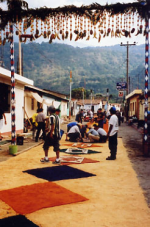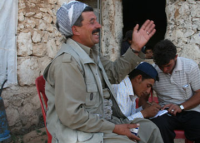Cultural Anthropology at the University of Kentucky
Cultural anthropology at the University of Kentucky encompasses a broad range of content areas including applied, development, economic, ecological, feminist, medical, political, and urban anthropologies. For more detailed discussion of the range of research activities that faculty in the department pursue, reference the individual faculty profiles linked below. Students typically develop their graduate program (course choices and research topic) in consultation with a faculty advisor whose research area fits with the student´s interests.

Community members work together to build carpets during Holy Week in Guatemala. (Photo Credit: S. Lyon)
Students in cultural anthropology gain foundational knowledge in contemporary social-cultural theory as well as the history of anthropological theory. Students also gain practical skills in research methodology and design. Beyond core courses in theory and methods, students build expertise in their chosen areas of concentration by taking courses within the department of anthropology, and also across the UK campus (including, in particular, courses in geography, sociology, and social theory, among others). Demonstrated competence by the student in reading or speaking one or more languages may be required by the student's committee.
Students pursuing the Ph.D. in cultural anthropology at the University of Kentucky have had great success in securing competitive funding for their dissertation research. Students have received grants from, among other organizations, the National Science Foundation, Wenner-Gren, Social Sciences Research Council, Fulbright IIE, and Fulbright Hays. See the graduate student pages for more information about the kind of research and funding that our graduate students pursue.

Amin Ahmed wisecracks in the foreground. Qadiye Village, near Zakho, Kurdistan Region, Iraq. (Photo Credit: D. King)
Students completing a graduate degree with a concentration in Cultural Anthropology from the University of Kentucky have found impressive employment with a range of private, public and international organizations including, university teaching and research, NGO / development work in the US and abroad, US government agencies, and the National Park Service among many other positions.
Cultural Anthropology Faculty:
- Lisa Cliggett
Ecological and economic anthropology, livelihoods, household, gender, kin networks and social organization, political economy and ecology, migration, aging, anthropological demography, GIS and remote sensing; sub-Saharan Africa, Zambia, Haiti, Caribbean. - Crystal Felima
Disaster and emergency management, structural inequalities, community resilience, Haiti. - Diane E. King
Identity, migration, kinship, gender, religion, the state, ethno-history, conflict and its resolution, political organization, international development; Southwest Asia / the Muslim Mediterranean, Kurdish studies. - Ann E. Kingsolver
Political anthropology, globalization, Appalachia and Mexico -
Science, biomedicine and technology; anthropology of microbes and microbiota; infectious diseases; anthropology of dirt; soil ecologies and soil sciences; global health; the state; multispecies ethnography; multisensory ethnography; Georgia (country), former Soviet Union, the U.S.
- Bertin Louis Africana Studies, cultural anthropology, race and racism, African Diaspora, Religion, Human Rights, Statelessness, migration, Haiti, Haitian Studies, Haitian Protestantism, antiracist movements, The Bahamas
- Sarah Lyon
Economic anthropology, gender and agricultural development, alternative food networks, ethical consumption and fair trade, coffee, Latin America, indigeneity - Kristin Monroe
Anthropology of the Middle East, urban anthropology, cultural geography, mobility and migration studies, political anthropology, built environment, youth culture, conflict studies, military culture - Monica L. Udvardy
Cultural anthropology, cultural property and heritage management, cultural identity politics, anthropological ethics, gender, women's activism and organizations, anthropology of symbols and meaning; Sub-Saharan Africa, East Africa, Kenya, Tanzania. - Mark P. Whitaker
Cultural anthropology, religion, politics, nationalism, journalism, Human Rights, the anthropology of violence and trauma: Sri Lankan Tamils, the Tamil diaspora (Toronto, London, and the US), and South Asia.
Affiliated Faculty
- Srimati Basu, Gender and Women’s Studies and Department of Anthropology.
Gender, law and the State, marriage and kinship, development, social movements; South Asia. - Lee Blonder, Department of Behavioral Science, College of Medicine.
Medical anthropology, brain and behavior, evolution of language, emotion and psychopathology. - Beth Goldstein, Educational Policy Studies and Evaluation, College of Education.
Anthropology and education; Southeast Asia. - Thomas Håkansson, Adjunct Professor, Department of Anthropology.
Economic anthropology, political ecology, world-systems, historical anthropology, comparison, kinship and marriage; East Africa, Scandinavia. - Karl B. Raitz, Department of Geography.
Cultural geography, recreation, tourism, settlement; North America, Appalachia. - Nancy Schoenberg, Department of Behavioral Science, College of Medicine.
Medical anthropology, health and aging, chronic disease management, qualitative methodology; North America. - Shaunna Scott, Department of Sociology.
Political economy, gender, social theory; U.S., Appalachia. - Mark Swanson, Department of Health Behavior, College of Public Health
Local food systems, food and public health, School nutrition, alternative agriculture; U.S., Latin America. - Jean Wiese, Department of Behavioral Science, College of Medicine.
Medical anthropology, communications, response to illness; Caribbean.
Cultural Anthropology Courses
Required
- ANT 601 - CULTURE AND POWER
- ANT 610 - HISTORY OF THEORY IN ANTHROPOLOGY
- ANT 660 - ETHNOGRAPHIC RESEARCH
- ANT 662 - RESEARCH DESIGN
Other
- ANT 600 - PRACTICUM IN TEACHING ANTHROPOLOGY
- ANT 603 - HUMAN BIOLOGY IN CONTEXT OF SOCIOCULTURAL CHANGE
- ANT 604 - SOCIAL ORGANIZATION
- ANT 620 - TOPICS AND METHODS OF EVALUATION
- ANT 621 - ADVANCED TOPICS AND METHODS OF EVALUATION
- ANT 637 - SOCIOCULTURAL DIMENSIONS OF ECONOMIC DEVELOPMENT
- ANT 640 - SCIENCE, AGRICULTURE AND DEVELOPMENT
- ANT 641 - GENDER ISSUES IN DEVELOPMENT
- ANT 645 - ANTHROPOLOGY AND EPIDEMIOLOGY
- ANT 646 - GLOBAL HEALTH: PEOPLE, INSTITUTIONS AND CHANGE
- ANT 724 - ANTHROPOLOGY OF THE STATES
- ANT 725 - SEMINAR IN APPLIED ANTHROPOLOGY
- ANT 731 - SEMINAR IN SOCIAL AND POLITICAL DYNAMICS
- ANT 732 - SEMINAR IN ECOLOGICAL ANTHROPOLOGY
- ANT 733 - SEMINAR IN SYMBOLS AND MEANING
- ANT 734 - SEMINAR IN ECONOMIC ANTHROPOLOGY
- ANT 735 - SEMINAR IN PRACTICE AND ACTION
- ANT 736 - CULTURE, ENVIRONMENT AND DEVELOPMENT
- ANT 737 - GENDER ANTHROPOLOGY
- ANT 765 - ADVANCED SEMINAR IN MEDICAL ANTHROPOLOGY
- ANT 766 - GENDER, ETHNICITY AND HEALTH
- ANT 774 - FOOD AND FOOD SECURITY IN A CHANGING WORLD
